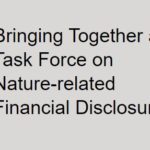
WBCSD launched the new report “Sustainability and enterprise risk management” at the World Economic Forum in Davos.
The report marks the first step in bridging the gap between the way companies consider sustainability issues in their risk management processes, and the way they disclose these risks to investors.
For example, in one of the report surveys:
- 89% of companies indicate that sustainability issues could have a financial impact on their business.
- Yet, 70% don’t believe their risk management practices are adequately addressing those risks.
- Further, only 29% of the companies who outline material sustainability risks in sustainability reporting reflect the same information in their legal filings or disclosures.
At WBCSD, we are committed to helping companies move toward using, understanding and disclosing their sustainability risks and opportunities. This report creates a clear starting point for our future efforts.
Why is the report important?
2017 sees the 12th edition of the World Economic Forum Global Risk Report. In it, we see that the top risks identified have to do with societal or environmental sustainability concerns.
The WBCSD Report indicates that the risks companies indicate in their sustainability reports are often different from the risks they disclose to their investors or in legal filings.
Out of 170 companies studied, 35% showed no alignment between sustainability reports and legal filings, compared with 8% who showed full alignment.
What does it tell us?
The report clearly demonstrates that there is more work to do in translating sustainability risks into the language of businesses. It’s critical for companies to use mainstream risk disclosure models (such as COSO or ISO enterprise risk management frameworks) to bridge the gap.
We are pleased to be working with key partners over the course of 2017 to start new work on developing guidance for business to identify and prioritize issues related to sustainable risk management.
How does it fit in with other approaches?
This report complements the Task Force on Climate-related Financial Disclosure’s (TCFD) Recommendations for climate-related financial disclosure.
By creating strong performance metrics that are compatible with existing financial disclosure requirements, the new framework aims to enable companies to disclose, discuss and compare their risks in a clear and meaningful way.
WBCSD’s approach to risk management builds on data and approaches forged by assessment and disclosure of climate risk to include all social and environmental aspects of sustainability.



